#crown prince thutmose
Note
About the "Egyptians didn’t actually worship cats themselves-". What if they did it jokingly , half affectionately? Like how people now in the 21st century sometimes refer to cats as "our feline overlords" , " boss" ,"king" queen" "meowster" ? Like "ahaha this funny".
I don't think they would've, but even if they did, we don't know! Cats with proper names are rare to begin with. Crown prince Thutmose's cat being named Ta-miut ("the she-cat") is similar to calling your cat "kitty", "puss" or just "cat". Most extant examples of cat-address we have are pretty similar to that, the only exception that I know of is a cat named "Nedjem", which means "sweetie". So if Egyptians jokingly used royal address for their cats, they've not left us any evidence of that.
36 notes
·
View notes
Text
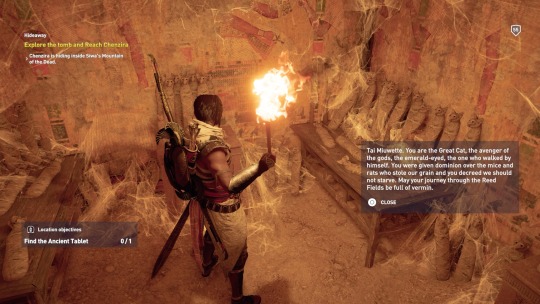
hands down my favorite thing in ac origins (apart from how prominently featured my goddess sekhmet is) is the inclusion of tai miuwette. the name translates to “the little mewer” and was the name of an ancient egyptian cat who was beloved by the crown prince thutmose. this is the epitaph that was found at his grave 🥲
1 note
·
View note
Photo
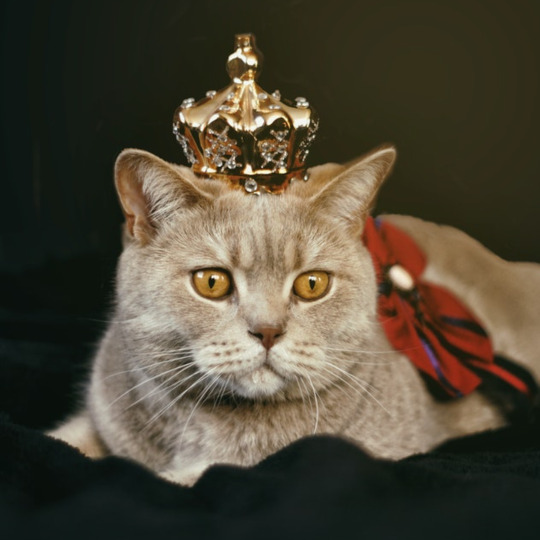
Cats were much more than Royalty in ancient Egypt. They were thought to be some kind of divine being. So it stands to reason that our modern cats occasionally act in ways that suggest we are the Pets, not them. Over 5,000 years ago, an Egyptian city was founded expressly for the purpose of worshiping the feline idol Bastet. The goddess Mafdet was commonly depicted with a cat-like head, which made her impervious to dangerous things such as snakes and scorpions.
Crown Prince Thutmose had a cat named Ta-Miu, he was the firstborn child of Pharaoh Amenhotep III and Queen Tiye. Ta-Miu was mummified and buried in a magnificent sarcophagus after death. The Ta-Miu sarcophagus was totally covered in decorative scenes, the lid was etched with hieroglyphs, and the back of the coffin portrayed a cat at an offering table and a lotus blossom, a sign of rebirth and resurrection. In addition, cats were buried with supplies like milk and mice for the afterlife. How considerate!
To learn more about why Cats act the way they do, please visit: https://www.mypetsup.com
1 note
·
View note
Text
as far as i know, pharaohs just didn't ask to be buried with their children, young or otherwise. it just wasn't a thing. like yeah, the very early dynasties might have required the pharaoh's most beloved/trusted family members and advisors to follow him in death as some kind of sacrificial offering but that practice is unheard of in later dynasties, including the 18th. so like... when i learned that tutankhamun's tomb also contained two stillborn little girls i nearly cried tbh. this is such a powerful statement, a testament of love and grief that still survives to this day, over 3k years later. we're talking about a world where children weren't acknowledged by the monarch in the form of statues or reliefs unless they were believed to be heir apparent. in ancient egypt, a royal daughter had a consistently hard time trying to link herself to her father. hatshepsut, tut's ancestor, spent her whole life trying to convince the elites and the people that she was her father's daughter and thus entitled to reign in her own right, by building funerary temples and statues in her father's name. in spite of all her propagandistic efforts, thutmose i probably did nothing in his life to suggest that he was very fond of his daughter, nor that he wanted her to be buried at his side, or to rule after him when he would die. and yet... tutankhamun just... went and changed everything we have ever known about royal ancient egyptian parenthood. he fathered no strong sons, no crown princes, nothing of the sort. all he had were two female fetuses, born before their time, inconsequential, unworthy of even being mentioned in the chronicles, let alone being mummified and entombed like royal princesses. but that young disabled king was also a grieving father, and he made sure that their little bodies would be preserved and laid to rest next to him. did tut know that the dynasty would end with him, ankhesenamun and their two stillborn daughters? probably. but did he care? because to me it looks like he has been wanting to state that he owned up to his offspring, however sickly and failing it might have been. other pharaohs would have been ashamed of such a disappointing reproductive outcome, and might have disposed of the bodies accordingly, but not him. he loved his daughters, and wanted to be near them in the afterlife too.
#for someone who had to shoulder the greatness and folly of his father all by himself....#and be plagued all his life by physical pain and loss and the crushing weight of failure.... he did very well. im proud of him#and his sister-wife too.... i love ankhe with a passion and im so sorry that she had to submit herself to that traitor ay's bidding#they were both very strong. and paid the price of not being as heartless as their ancestors#sorry about the rant i suppose#this has been sitting on my noggin for a while#rant.txt
13 notes
·
View notes
Text
Cats that changed the course of history

Photo by Linnea Sandbakk on Unsplash
Ailurophilia comes from Classical Greek, meaning “cat loving” or “love for cats”. We will dive into this topic from three different perspectives: historical, modern and scientific, even though there is much more than that to our feline friends.
Cats in ancient Egypt:
The first known cat with a name was called “Nedjem” meaning “sweet” or “pleasant” and dates from the reign of Thutmose III (1479 -1425 B.C.) in Egypt.

Cat in tutmose’s tomb
Nedjem was found in the tomb of a noble man named Puimre, and unlike dogs, it was uncommon to name cats in ancient Egypt.
Domestication of cats started in the Near East around 7500 B.C. It was long thought that cat domestication was initiated in ancient Egypt around 3100 B.C.
We know very little about the short life of the crown Prince Thutmose although most of the knowledge we have we got from his cat Ta - miu. Ta -miu served as his personal pet, we know nothing about how she died, but she was mummified and her sarcophagus tells us most of what we know about her owner.
In ancient Egypt, Bastet, the god of love, was portrayed with a cat’s head. It is not difficult to imagine why, as grain was of essential importance to the country and the cats successfully killed the country’s grain-destroying rats and dangerous cobras.
Killing a cat in ancient Egypt meant a death sentence. Perhaps that’s why 3,000 cat mummies were found, buried in Beni-Hassan; the worlds first known pet cemetery, which is 2,000 years old. Here we find cat mummies wearing remarkable iron, and beaded collars.
According to Greek historian Herodotus, the Egyptians would shave their eyebrows as a mark of respect when mourning the loss of a family cat.
The Egyptians fascination with cats is partially due to the fact that cats were seen as possessing a duality of the desirable temperaments. On one hand, the can be protective, loyal, and nurturing, but on the other hand, they can also be pugnacious, independent and fierce.
The battle of Pelsium 525 B.C.
The Macedonian author Polyaeunus wrote that there was a war in 525 B.C. between Egypt and Persia. He suggests that the invading Persian army used cats to shield the self from Egyptian arrow fire. The Persian king Cambyses II persuaded troops to carry these “mystical” animals into the battle to prevent Egyptians from fighting back.
As a result, the Egyptians lost the war and as a consequence the Persian period of pharaohs in Egypt followed and it would last for 200 years.
Cats in the Roman Empire.

Photo by Alvan Nee on Unsplash
The most commonly used pets in the Roman world were caged birds, especially liked by Roman women. A lot of Roman love poetry was dedicated to birds.
In poetry birds were directly related to love, catching a bird meant human pursuit and seduction, caged bird for captured lover and dying bird for withering love or end of a love affair.
Roman cat smugglers, got the cats from Egypt to the Roman Empire before the time of Christ. The cats served as mouse haunters for the Roman legionnaires, who in turn introduced cats to Britain. The brits and Welsh fell in love with them as they controlled mice and disease, they even made cat-killing a hanging offence.
Back in Italy, cats finally moved into people’s homes replacing pet snakes and domesticated weasels.
Much later in the 1370s, an Italian writer Arqua’ Petrarch near Padua, used his cat to protect his books from getting eaten by mice, the feline was later embalmed.
Cats in Asia protected the silk industry by guarding silk cocoons from small predators.
Cats in modern times.
Guinness record cats.

Photo by Nina Mercado on Unsplash
Longest living cat, was born on August 3rd1967, cream puff lived until August 6th 2005, for a total of 38 years and 3 days. Recorded in the Guinness book of world records as the oldest cat to have ever lived. Her grandfather “Rex Allen” lived 34 years and 2 months.
Towser “the mouser” killed about 28,899 mice over a period of 24 years. About 1,210 victims annually and 3 mice a day. She got the Guinness world record for the most mice caught. The people in Crieff in Perthshire, Scotland erected a bronze statue in the memory of Towser upon her passing.
Astrocat.
Astrocat, the first cat in space, took off on October the 18th 1963 in a French Veronique AGI projectile shot from the Algerian Sahara Desert rocket base. During the 15 minutes long flight, Felicette reached an altitude of 260 miles and safely returned to earth. A bronze statue was built in her honor in 2019 at the international space university. Felicette was the only cat ever having travelled and returned safely outside the earth’s atmosphere.
Even in modern times cats were used in wars by the Germans to spread poisonous gases in the 17th century. Even in Britain cats were used during the 2nd world war, as an early warning signal that airplanes were coming as the cats went hiding whenever hearing airplanes.
The use of cats in medicine.
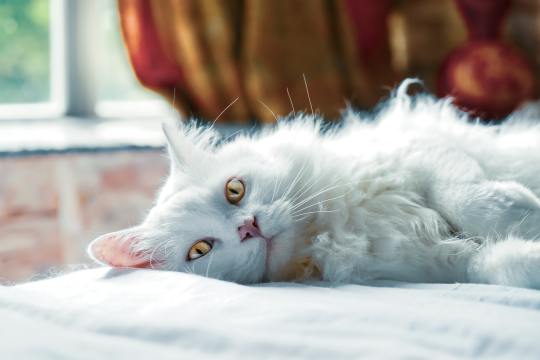
Photo by C. Z. Shi on Unsplash
A car purrs within a range of 20-140 Hz, which is known to be medically therapeutic for illnesses in humans. A cat's purr can not only lower the stress it can also help labored breath, lower blood pressure, help heal infections and even heal bones.
Meows are not innate cat language they developed them to communicate with us humans!
Domestic cats spend 70% of the day sleeping and 15% of the day grooming.
Why do cats always fall on their feet?
In 1894 Etienne- jules Marley used a chronophotic camera to watch a cat fall in slow motion. He discovered how a cat really falls and why it always lands on its feet.
Cats have an inbuilt balancing system called the “righting reflex”, they can orient themselves and land on their feet. The higher the fall, the more time the cat has to be able to right their position for the fall. When the cat reaches maximum speed (in the fall) they relax and stretch their legs, like a flying squirrel, their body expands and creates air resistance, like a parachute.

Photo by Alex Meier on Unsplash
Nowadays most people have cats as pets for companionship. We even have an international cat day every year, on the 8th of August.
The journey has been long and the reasons for having cats have been various and different. Whatever the reason is, or was, for having a cat, the cats have done a great job!!!
Further readings:
https://pethelpful.com/cats/
https://www.purina.com/
https://www.historyextra.com/period/modern/top-cats-history-unsinkable-sam-mrs-chippy-wilberforce/
https://www.ripleys.com/weird-news/mailed-cat/
https://modkat.com/
9 notes
·
View notes
Photo
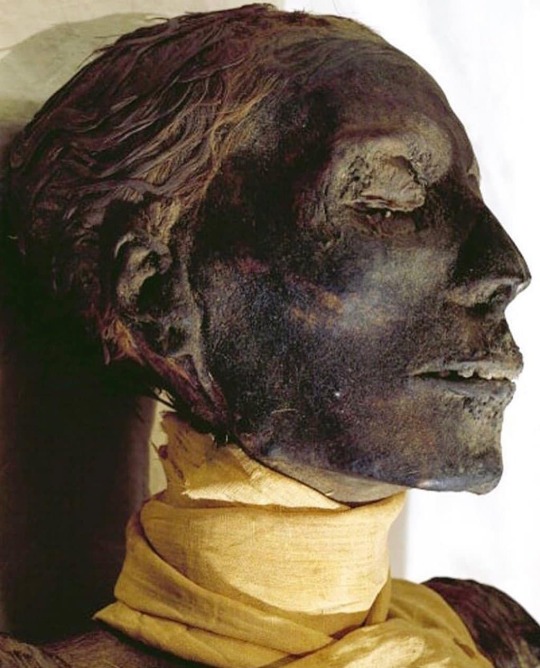
Reposted from @valleyofthepharaohs Thutmose IV’s Mummy. An unexpected #ruler, Thutmose IV came to #power through means that are not yet fully understood. He was the son of Amenhotep II and Tiaa, but was not crown #prince. His father had chosen another successor to the #throne. Some #scholars say that Thutmose usurped his older brother in order to take power by force. Thutmose's most celebrated accomplishment was the restoration of the Great #Sphinx of Giza and subsequent commission of the #Dream Stele. According to Thutmose himself, while out on a #hunting trip, he rested under the head of the Sphinx, which was buried up to the neck in #sand - even in his time the Sphinx was a mystery. He fell asleep. The Sphinx visited him in a dream. He told him that if he cleared away the sand and restored it he would become the next #pharaoh. And so the young Tuthmose restored the #mysterious Sphinx. He placed a #stone tablet, now known as the Dream Stele, between the two paws of the Sphinx. The story is pure propaganda. Tuthmose needed a #divine tale to legitimise his sudden #ambition and take over. It worked. Photo: Theban Mummy Project. #egyptian #egyptology #archaeology #mummy #royalty #discover #history #historic https://www.instagram.com/p/CS5OGd_jV-w/?utm_medium=tumblr
#ruler#power#prince#throne#scholars#sphinx#dream#hunting#sand#pharaoh#mysterious#stone#divine#ambition#egyptian#egyptology#archaeology#mummy#royalty#discover#history#historic
1 note
·
View note
Photo
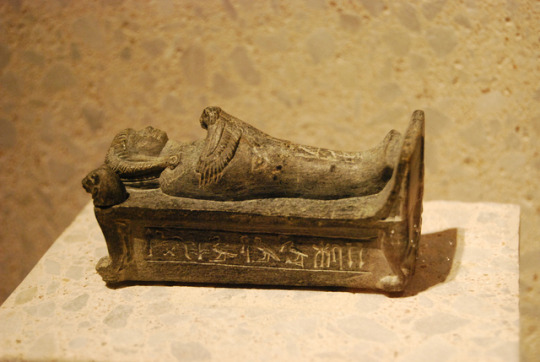
Statuette of prince Thutmose lying on a bier, (with sarcophagus).
Crown Prince Thutmose was the eldest son of Amenhotep III and Queen Tiye. He died late into his father’s reign, leaving his younger brother Amenhotep (Who would later change his name to Akhenaten) as heir to the throne.
32 notes
·
View notes
Photo

Head of Amenhotep III from temple of Amun-Ra, Karnak. Ninth pharaoh of the 18th dynasty. Amenhotep III ruled Egypt during the peak of its international power and prosperity, during a time of peace, when art and culture flourished. He was the son of Thutmose IV and became crown prince at around 12 years old when his father died. He would have had a regent holding the reigns of power until he became an adult. He was a very capable ruler and maintained his power over Egypt by reducing the power of the priests of Amun and elevating the sun God Ra. He also forged strong alliances with foreign powers by marrying the daughters of foreign Kings from Babylon and Syria and a few years into his reign he married Tiye who became his Great Royal Wife. Born 1388 BC Died 1353 BC Reigned from 1391 - 1353 BC. #amenhotep #ancient #egyptian #history #museum https://www.instagram.com/p/CDNIcPFnt5p/?igshid=xb5uzx4ehfb3
0 notes
Text
The Tenth Plague

By the spring of 1483 BC, Egypt was in the dreadful throes of the first five plagues cast down upon them by the God of Abraham. People sweltered and anguished beneath the summer sun, amidst the rot, the frogs, the lice and the carrion flies—and the Nile still ran crimson from the city of Swenett to the delta. Like veins, the red river bled into the smaller irrigation canals and killed every crop it touched. Starvation followed soon after for the humans and livestock, but not for the crocodiles that emerged from the river to pick through the carcasses of dead cattle.
Then, just when it seemed that the great Kingdom of Egypt couldn't become any more of a foetid hellscape, the boils came, as though the pestilence had been swept in by the Northern wind. The sixth plague set upon the population in a few short days, making quick work of the poor before overwhelming the upper rungs of Egyptian society as well. Soon, the beautiful faces of the Pharaohs Harem were marred by the pox; accompanied soon by every priest in the temple and every guard at the palace doors. Even the Pharaoh eventually succumbed to the sixth Plague.
Even while he clawed at his unsightly face in agony, he refused to surrender to the false God who lorded over him, regardless of the hells that would be inflicted upon the Kingdom. Instead, the Pharaoh sent troops to raid the slave settlements, where they terrorised the residents and hung the conspirators and instigators from the gallows.
God watched from above, enraged by the indignance of the Pharaoh; so He responded in kind and sent the most feared of his children to the palace at Thebes.
She came at dusk, entering the royal residence and bypassing the guards like mist through their fingers. Even in the humidity of summer, the Pharaoh and his advisors felt the chills as she approached, though they knew not from whence it came. The sun vanished beyond the horizon, and the city became dark, save for the light of the torches, when a pair of silver eyes opened amidst the shadows of the hypostyle hall. The owner of said eyes stepped closer and closer. Each step brought them nearer to the light of the torch.
The Pharaoh summoned close his guards as the disembodied stare was joined by a pallid face, followed by great lengths of white hair, and then a body swathed in black cloth. It was a woman, but not at all in the traditional sense, not like the women of his Kingdom. Though her waxen skin appeared young, something about the woman struck him as ancient and alien; whether it was her piercing gaze or the regal way in which she moved as if she was balancing a heavy crown upon her immaculate silver head. The woman seemed to glide into view—grey eyes flashing dangerously and thin lips drawn into a tight line.
“Who is it that breaks into the palace to demand an audience with a King?” the Pharaoh answered, barely containing his rage.
“My name is not important, God King,” She replied truthfully.
The Pharaoh’s guards moved, thrusting their sharpened spears towards her, only to find themselves disarmed by an invisible force and launched back against the wall behind them. The Pharaoh watched on as their fragile bodies collided with the solid stone; their bones cracking and flesh tearing on impact.
“Are words such a threat to you?” Azrael inquired as she lowered her hands.
“Guards!” The Pharoah cried out for reinforcements as the women advanced.
“This message is four hundred years overdue,” She said. “And you will listen.”
“Message about what?” Thutmose demanded, eyes narrowed and jaw tense.
“The Israelites you are using to build the naval bases at Perunefer,” Azrael explained.
“You must be an associate of Moses and the other instigators.” Thutmose hissed with venom in his voice.
“I’ve come to tell you that you have exactly two weeks from now to release them from servitude.” Azrael declared, ignoring the Pharaoh’s belligerence.
“You have no power, no place to demand such actions from me.” Thutmose raised his voice.
“I will return on the eve of the fourteenth night. If the Israelites are still enslaved, then I will strike down your eldest son and heir in his prime, and I’ll do the same to every first-born within the realms of your kingdom.” Azrael warned in an ominous voice just as all the torches were extinguished.
“Empty threats from a powerless God.” The Pharaoh spat, even as he itched at his face.
“You cannot own a soul,” Azrael answered, her stare gradually becoming more malevolent.
“I am King, I can own whatever I want,” Thutmose replied arrogantly.
“A King is a man.” Azrael snapped. “You are a man, weak like your Father and his Father.”
“How dare you.” Thutmose barked.
Azrael’s thin, pale lips twisted up into a smirk, and she laughed low in her throat. When the torches re-ignited, Azrael was gone.
A fortnight of violent thunderstorms and locusts passed, and still, the Pharaoh refused to surrender his ownership of the Israelites. He would not bow or show fear to a foreign God, even if his skin itched and his apartments were filled with frogs and locusts. So, the royal family prepared for bed, foolishly believing they were safe with triple the guards at their doors. The princes went to their heavily guarded rooms, the royal women of the harem settled into their quarters, and the king retired to his large apartment.
Meanwhile, the slave settlements and slums belonging to the Israelites were closing down ahead of the sunset. They painted lambs blood on their doors, bolted them shut and locked the wooden shutters over the windows, for they knew that Azrael was coming.
In the distance, thunder echoed, and lightning flashed. Another storm, an especially dark one this time. Moses waited, listening to the wind and the shutters rattling against the locks.
They knew when Azrael had entered the city. They felt it in their bones. The temperature dropped to the point that each one of them could see their own breaths like smoke in the light of the oil lamp. There was silence, absolute dead silence.
Suddenly, a shadow passed in front of the moonlight outside and the oil lamps went out in the huts, leaving them in darkness. Every man, woman and child, whether they knew it or not, stopped breathing. Though they were protected and they tried not to be petrified by the presence of an Archangel, fear nonetheless overcame them.
One little girl peered through a crack in the shutter to see all the lights in the city going out. Every torch, every oil lamp, every flame turning to darkness. Her young eyes scanned to the right and fell upon none other than the haunting image of Archangel Azrael.
She seemed to glide across the floor like a phantom, trailing long black robes behind her. The little girl could not see her face from where she peered through the shutters. All she could see was the lower jaw of a pallid woman peaking out from beneath a black hood. Immediately, Azrael's silver glare turned and locked on to the narrow crack in the shutter that the little girl had been using to spy on her, causing the little girl to gasp and pull away.
When the little girl plucked up the courage to glance back, Azrael was gone.
By the early hours of the morning, before the sun appeared on the horizon, all of Egypt was dealt with in the same calculating and emotionless efficiency as every order Azrael undertook. Corpses lay in almost every home, from Thebes to Memphis to Heliopolis, waiting to be discovered by their parents or guardians—all save for one.
Azrael still had to complete the most critical task, the winning move in the four hundred year game of chess the Pharaoh’s family had been playing against God. So, she entered the royal residences in darkness, invisible and silent.
No locked door or guard could stop her. The guards couldn’t even see her, let alone prevent her from getting into the room of Prince Rameses. She navigated the ornately carved stone halls and grand rooms with ease, with deadly intent, passing pillars and sculptures of Amun painted with gold leaf.
Within sixty seconds of entering the extravagant complex of the Pharaohs, Azrael was standing at the bedside of seven-year-old Prince Rameses, the future Pharaoh and successor to his ailing Father Thutmose II. He slept peacefully, probably dreaming about ruling over a great nation and commissioning elaborate building projects constructed upon the backs of slaves. Another God King, another man arrogant enough to believe the lie of his forefathers.
They were just men with egos the size of a planet and the world did not need more of them, but her personal opinions didn’t matter. All that mattered was following her orders. Azrael held her stilled hand flat just above the boy’s chest, never showing hesitance or remorse. His heart fluttered and stopped, and his skin paled in a matter of moments.
The future King was dead.
Azrael retracted her hand swiftly and wheeled around towards the door, black robes sweeping about her. The quicker she left, the better. The whole city stunk of death, rotting flesh and blood in the humid night air, even without all the fresh bodies.
When the sun rose, terrible screams echoed across the land, in the streets of every city, through the valley of the kings and across the red sea. Mournful cries from mothers in their homes disturbed the morning, waking those who hadn’t yet discovered what horror had befallen Egypt.
Thutmose burst through the doors of his apartments to hear the hysterical shrieks of Iset, the pregnant mother of Rameses. Despite his ailments, the Pharaoh sprinted down the hall towards the Prince’s room. What he set eyes on when he turned the corner made his blood run cold.
There, Iset cradled the corpse of his son, his only living heir. Tears ran down her pox-ridden face as she rocked him back and forth, howling so loud that Thutmose felt a ringing in his ears. He dropped to his knees, a blank look in his eyes. How could it be? How could a foreign God invade his kingdom, his city, his palace? How could that woman enter and leave his palace like a ghost?
“My son! My son!” Iset shrieked over and over.
Outside, the screams were the same as chaos overcame the city. Crowds of grief-stricken Egyptians had swarmed at the palace gates.
“Your majesty, what do we do.” One of his advisors spoke sheepishly.
But the Pharaoh did not answer, for all he could hear was Iset’s screams.
It took seventy days for the Prince’s body to be embalmed and prepared for burial at the Mortuary Complex. Thousands upon thousands of corpses from Egypt’s lower classes had already been buried in the ground, and God personally drowned the entire Egyptian army in the Red Sea. It was truly a grim atmosphere all across Egypt. Defeated, Thutmose returned to Thebes accompanied by several dozen surviving soldiers. Upon returning, he had to send his son to the afterlife.
In the noonday sun, the procession for Prince Rameses traversed the valley with offerings, luxurious furniture, jewellery, chariots and statues. The Pharaoh and Iset walked at the head of the procession, leading their son’s sarcophagus up the long ramp towards the magnificent mortuary complex, the resting place of Pharaohs before.
Thutmose cast an eye towards the cliff above, and there stood Azrael, still swathed in black robes billowing in the wind. Although a hood overshadowed half her face, he could still feel her watching him with those silver eyes, as if Azrael and her Father hadn’t already made their point.
There was true, unmistakable malevolence present in the dark figure standing atop the towering limestone cliffs. It wasn’t hate in her eyes, it was just the absence of love that frightened him. He looked back down at the approaching entrance to Deir El-Bahri. Here he would say farewell to his son, like so many fathers had done in the past weeks.
I will see you once more in the afterlife.
2 notes
·
View notes
Photo
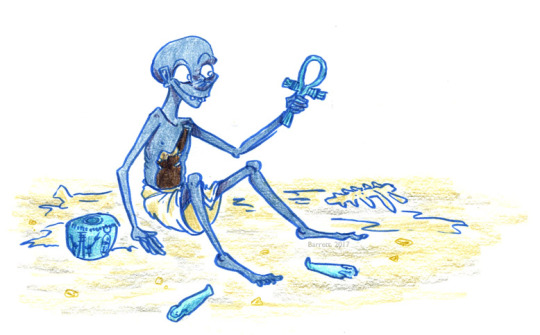
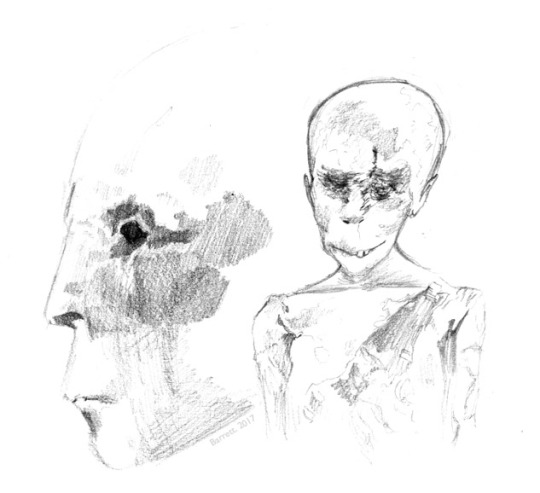


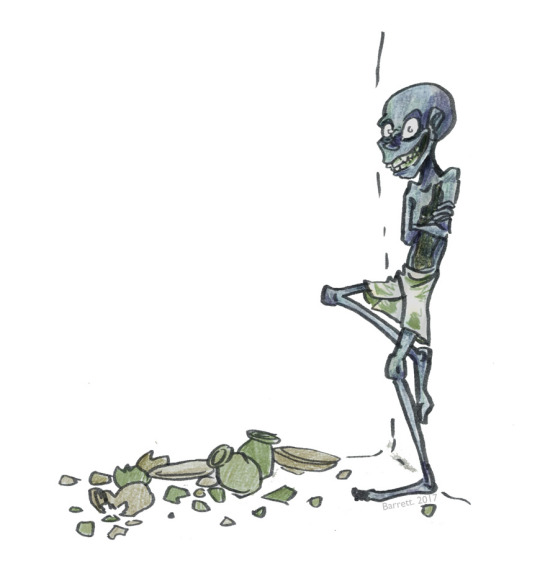
Hooray, it’s the first instalment of Mummy of the Week, presented by the Crow Press! This week we’ll learn about one of the sons of Thutmose IV.
(Also, I am reuploading this because Tumblr made a mess and pixellated a couple of the images. If I do it as an image post, that might work.)
Name: Amenemhat.
Age: probably between 8 and 12.
Dynasty/ approximate dates if known: reign of Thutmose IV (roughly 1401 - 1391 BCE or thereabouts). 18th Dynasty, New Kingdom.
Where found: KV43, the tomb of Thutmose IV.
Current location: KV43.
Tomb KV43 was discovered by Howard Carter in 1903 on behalf of Theodore M. Davis. The tomb’s owner, Thutmose IV, had been found a few years previously by Victor Loret in 1898, in a cache of royal mummies hidden in tomb KV35, which belonged to Thutmose’s dad Amenhotep II.
As with most tombs, KV43 had not escaped the attentions of tomb robbers eager to get their hands on the treasures of the dead king; there are records of this happening less than a century after the death of Thutmose IV written on the wall of the second rectangular room by two of Horemheb’s officials, Maya and Thutmosis, who had come to tidy up and reseal it.
Carter crept through the tomb, peering into every chamber and around every pillar, and found many fascinating things, including fragments of a chariot, bright blue faience vessels, mummified joints of meat for the king to eat in the afterlife, broken jars that had been filled with grain, wall paintings of the king having ankhs presented to his nose by various eminent deities - and the mummy of a small boy, propped up against the wall of one of the side-chambers.
This little fellow - whose chest and stomach had been torn open in antiquity by tomb robbers looking for valuable amulets and jewels - turned out to be Amenemhat, one of Thutmose’s sons, as some of his funerary equipment was found in the tomb, including some of his canopic jars.
Poor Amenemhat was discovered in a state of undress; in addition to slicing him open, the robbers had taken all his bandages off him and left them in another side chamber, where he was presumably unwrapped. (I always draw him wearing a kilt because there are some things I won’t draw.)
Near the little mummy were the remains of various vases and shabtis and what-have-you.
Amenemhat is a rare mummy - there aren’t many royal juvenile Egyptian mummies that we know about, and he is also one of the last three mummies to remain in the Valley of the Kings. The other two are Tutankhamun, and a young boy in KV35 of mysterious identity.
Click here to see more details about tomb KV43! (Warning: there is a small picture of Amenemhat propped up against the wall. Also, if you click on the link on that page saying View 48, you can see the poor little chap in what I presume is his current state, reposing on a bed of rubbish.)
Click here to see one of Amenemhat’s canopic jars!
Click here to read Crown Prince Djhutmose and the Royal Sons of the Eighteenth Dynasty by Aidan Dodson! (Warning: a bit of discussion of mummies, and also a picture of Amenemhat’s face on the last page.)
4 notes
·
View notes
Note
Sorry to add to your long list of asks, but:
I can haz 'Thutmose loved his cat' story?
Oh don't worry, I love talking about Thutmose and his cat!
Anyway, so crown prince Thutmose was the son of Amenhotep III and would have succeeded him had he not died (we don't know what of) prior to Amenhotep III himself. We don't know a lot about Thutmose, but we do know he loved his cat so much that, upon her death, she got her own cat-sized limestone sarcophagus.
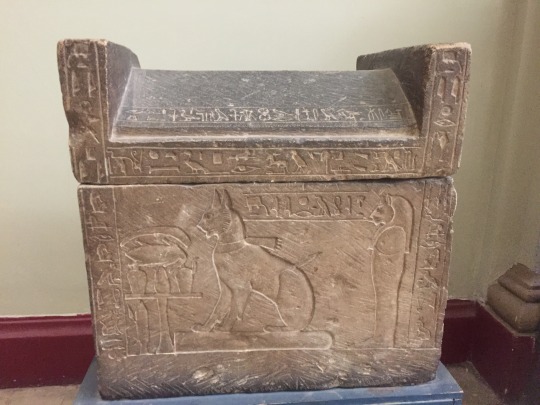
It even has Nephthys and Isis portrayed at the head- and foot-ends, just like a human sarcophagus would have:
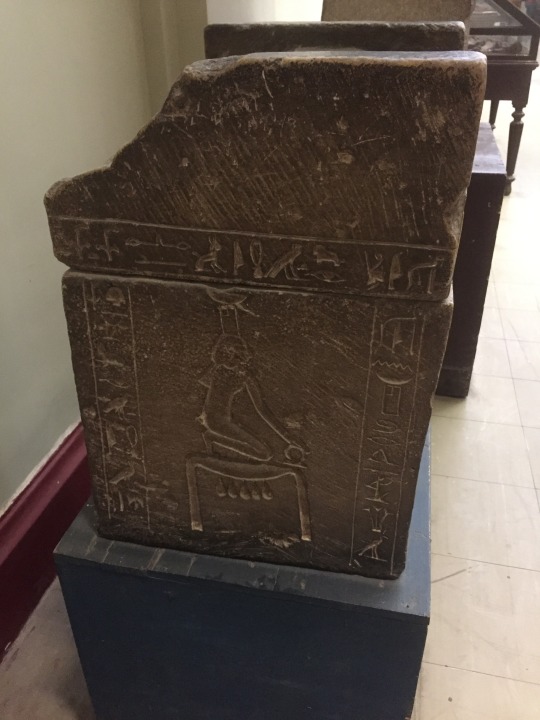

The cat's name was Ta-miut, and she will be remembered because of the love a prince who died ~3300 years ago had for her.
#it's Humanising History Week right now lads#egyptology#ancient egypt#crown prince thutmose#odds are he loved her so much because he might have been disabled himself and petting cats is known to alleviate chronic pain#so#totally take that with a grain of salt tho since it has absolutely no basis in historical evidence apart from him dying young
7K notes
·
View notes
Text
Anonymous
She didn’t talk to the snake, at first. Caught up in her dreams of romance, she saw no need to talk or think of anything else. It wasn’t until Adam went through and renamed everything she had named, that her fantasy started to crack, along with her faith.
It found her one day, crying by the waterfall so Adam would not hear. In whispers and hisses it asked why she was so forlorn. What was she crying for? The man or her vision of him? So Eve began spilling her heart out to the snake. It wrapped itself around her ankles, a strange but comforting hug.
Her relationship with the snake blossomed into a friendship. It would ask about her day, her thoughts, her feelings; it asked everything Adam never had. She asked these questions in return, and then others as she saw the depths of the snake's knowledge. It would hiss out stories and ideas of the world, one Eve knew she would never see. But how she yearned for it, this forbidden world of knowledge. It replaced her dreams of babies and a husband, turning them into dust as she recognized how small they were to her. Being just a wife might be fine for some other woman, but not for her. Not anymore.
Then God spoke to her and Adam of a tree of wisdom, whose fruit they were forbidden to eat. She kept her eyes modestly downcast, playing up her image of Wife, so God would not see the hunger in her eyes. So no one would know her desperation. As soon as Adam fell asleep that night, Eve began to plan. She quietly and innocently explored her home, seeking the tree. Eventually she stumbled on it, a tree hung with fruit made of light, whose bark seemed to glow and ripple. Eve was frozen. She had carefully laid out her plan up until this moment. Did she dare eat the fruit? Could she bear going back to her pale life? What would happen when she ate it? She didn’t even know if she could take a bite before God's wrath found her.
She thought of Adam, then. How simple he was, with no adventure, no spark. No interest in anything God had not told him to do. As she wondered, her feet carried her forward, stopping at the base of the tree.
"Eve!" Adam's voice rang out from behind her. He had never sounded so forceful. "Eve, don’t do it."
"Why?" Eve asked, turning to face him.
"Its forbidden." Adam's face was stony.
"But why?"
"Because, it is." Eve paused, considering him. He was more in God's confidence than she, and yet he had asked no questions. He knew only as much as he was told and never wanted more. And that lack of desire for knowledge made him nothing, in her mind.
"That's not a good answer." She reached up and plucked a fruit. Time slowed. Adam ran towards her, anger marring the features she had once admired. The glowing fruit lay in her hand, tantalizing. And she saw the snake, curled in the branches watching her. She raised the fruit in a salute, then bit down.
Light and dark filled her, such an expanse of knowledge that it pulsed inside her painfully. She knew she was screaming, but couldn’t seem to feel her mouth well enough to close it. Darkness was pouring out of her, equal in weight to the light and filled with horrors she could never have imagined. They spread through the world, twisting and changing it. Not all of the change was good; she could see this, and knew it was her fault. God loomed in the brightest light, and she saw her punishment before it was given, knew the pain and humiliation he would subject her and all her daughters to.
In that moment, Eve regretted nothing.
Hatshepsut was the first. Eve had told herself, after Eden, that she wouldn’t involve herself in the human world, that it wasn’t her place.
“Isis, I do not know what to do. Egypt needs a king, but my stepson is too young. I may act as regent for a time, but they will come for me, someday. A regent cannot protect the throne.” Hatshepsut had come to pray at the temple of Isis every night for the past week. Eve had watched her, had seen her turmoil, but she was afraid to involve herself. Was it her place, to offer advice to someone she could no longer relate to? “Who can I give the throne to without taking it from Thutmose?”
“Yourself”, Eve whispered. She hadn’t meant to say it, hadn’t consciously decided to give council. It was too late to go back, though, so Eve went forward. “You can be king, same as any man.” Hatshepsut sucked in a breath. There was no telling whether her shock stemmed from Eve’s suggestion, or simply from the fact that her voice seemed to be that of the goddess.
“The people will never accept me; they will never accept a woman.”
“Make them.”
She did. Hatshepsut made them accept her, made them respect her. Eve had never been able to do this, and she watched in awe, knowing that something great was happing. Hatshepsut had defended her right to the throne by making herself a man in the eyes of the people. While it bothered Eve that this was the only way to success, she cared more about helping Hatshepsut than she did about questioning the people’s prejudice.
Perhaps, Eve thought, there was merit in meddling with the flow of history, in helping carve out a place for women. Her king had defied all odds and led Egypt in a reign of wealth and expansion. Her stepson continued what Hatshepsut began, and Eve felt proud.
Proud, until he began to destroy all the images of Hatshepsut, erasing her from the story. How she cried, to know that her chosen one would not be remembered, would fade away until no one could tell you she existed.
Eve vowed to remember, even if she was the only one who did.
She whispered in Joan’s mind, telling her it was a false prince on the throne. And she watched as her sharp, fearless girl scanned the throne room, searching the faces. Looking for a sign. Maybe it was the man's face, proud but with lines as though a great weight rested on his shoulders. Maybe it was how healthy he looked, or the slight gap people left around him, as if afraid to touch him. What tipped her off didn't matter. What mattered was the gasps and whispers that rose as Joan knelt at the feet of the true crown prince.
"Your majesty," Joan said, her clear voice slicing through the chatter. Despite the hopeful murmur of his people, the king looked furious.
"This is impossible," he said. "You are but a glorified girl from a small town, who would never have had the privilege of seeing me."
"It is not I who saw through your deception, your majesty." Joan spoke to the floor, still kneeling before him. Eve felt a spark of hatred. This boy had not deined to raise her champion to her feet. He left her kneeling in front of him while he slandered her. Did he not realize what was being offered to him? The salvation that he was intent upon disregarding, simply because of her gender? How could he not see that France’s only hope was currently on the ground before him?
"Are you claiming to hear voices, child?" The crown prince was refraining from openly sneering, but his disdain was evident in his voice.
"Only one voice, your majesty. The voice of the father of us all." The entire room sucked in a breath.
Despite her roiling hatred, Eve didn’t care that Joan believed her voice was God's. Eve was anything and everything her girls needed her to be. For Joan, she was the unseen hand guiding her to victory after victory over England. There was joy here, in watching Joan succeed, watching her bring the crown prince to Reinnes for his coronation. Then there was horror, as everything fell apart. As she wondered if any of it had been worth it. As she whispered in her mind to ease the pain of her death and thought that, perhaps, this was all her fault.
Marie hit her hardest. Watching her slowly die, watching as her discovery leeched the life from her. She faded, drip, drip, dripping away like she was wet paint that could not stick to the canvas of her body. Eve felt herself falling away with her. Each day, as Marie looked worse and worse, Eve lost another piece of her conviction. Death approached like a train, going too fast and she knows it’s going to crash but you cannot look away. Eve wished she could look away.
She owed Marie more than that.
So she stayed, watching her friend, her brilliant girl die.
“Don’t cry for me.” Eve looked up, startled. Marie had been sleeping moments ago, but now she was staring at Eve, a sad smile on her face. “I chose this, and even knowing the consequences, I would choose it again.”
“Why? What is the point in dying for the benefit of those who may never appreciate you?”
“I didn’t do this for them. I did this for me.”
Eve nearly broke, then. She wanted to scream at her that the things we do for ourselves are the most dangerous ones of all. They are the ones that haunt you for years, the ones that take the monster in the closet and turn it into the face you see in the mirror. They are the ‘what if’s’, the days of arguing with yourself, desperately trying to justify something that cannot be justified.
Marie died three days later.
Time is a lie. A lie told to ease the strange feeling that nothing matters.
Nothing matters.
Did it ever? She thinks the answer is no.
But the faces never leave her.
She is sorry, so sorry. For Joan, for Marie, for Hatshepsut, for all of them. She failed them all. So many of them, and she can’t remember whether there are ten or one hundred or one thousand. She tries to remember, lists their names to herself, clinging to them because that’s all she has left. Joan, Marie, Hatshepsut, Boadicea, Amelia, Cleopatra… There are more and more and more, but each day there are less and less and less. Her name is never counted among those she apologizes too. Maybe it should be. It can’t be, she does not deserve to be classed with them. They were brave and strong and did great things. She was selfish and bitter and wrong. Besides, she isn’t Eve, hasn’t been Eve for years. He named her Eve, just as he meted out her punishment. The punishment of all of them. Eve belonged to Him, to Adam, to the world. Eve never belonged to her.
Joan, Marie, Hatshepsut, Boadicea, Amelia…
It’s not fair.
Fairness doesn’t matter, though. Not at the end. Not as she feels herself fading, forgetting herself, losing the ability to mark time, to see through the years and sort them into careful piles. The good, the bad; they mingle in her mind.
Joan, Marie, Hatshepsut, Boadicea…
Perhaps this is her final punishment. That she will forget herself, her dreams, her spark - but not them. She can never forget them. It is her job to carry them, their story, their truth. Eve wishes she was not disappearing, because she knows they deserve more than a fuzzy space in the memory of a girl who is fading.
Joan, Marie, Hatshepsut…
She thinks about her choices, now that everything is ending and she knows that it doesn’t matter, it can’t matter. This would all have happened with or without her. No world is made to be perfect.
But, maybe it could have been, without her. Maybe they are all her fault, all her fault, all her fault…
Joan, Marie…
She doesn’t know if she regrets it, anymore.
0 notes
Text
Anonymous
Please keep in mind this is the first draft of this story. Will probably revisit it later and make serious revisions and edits.
Only reblog please, don’t repost!
She didn’t talk to the snake, at first. Caught up in her dreams of romance, she saw no need to talk or think of anything else. It wasn’t until Adam went through and renamed everything she had named, that her fantasy started to crack, along with her faith.
It found her one day, crying by the waterfall so Adam would not hear. In whispers and hisses it asked why she was so forlorn. What was she crying for? The man or her vision of him? So Eve began spilling her heart out to the snake. It wrapped itself around her ankles, a strange but comforting hug.
Her relationship with the snake blossomed into a friendship. It would ask about her day, her thoughts, her feelings; it asked everything Adam never had. She asked these questions in return, and then others as she saw the depths of the snake's knowledge. It would hiss out stories and ideas of the world, one Eve knew she would never see. But how she yearned for it, this forbidden world of knowledge. It replaced her dreams of babies and a husband, turning them into dust as she recognized how small they were to her. Being just a wife might be fine for some other woman, but not for her. Not anymore.
Then God spoke to her and Adam of a tree of wisdom, whose fruit they were forbidden to eat. She kept her eyes modestly downcast, playing up her image of Wife, so God would not see the hunger in her eyes. So no one would know her desperation. As soon as Adam fell asleep that night, Eve began to plan. She quietly and innocently explored her home, seeking the tree. Eventually she stumbled on it, a tree hung with fruit made of light, whose bark seemed to glow and ripple. Eve was frozen. She had carefully laid out her plan up until this moment. Did she dare eat the fruit? Could she bear going back to her pale life? What would happen when she ate it? She didn’t even know if she could take a bite before God's wrath found her.
She thought of Adam, then. How simple he was, with no adventure, no spark. No interest in anything God had not told him to do. As she wondered, her feet carried her forward, stopping at the base of the tree.
"Eve!" Adam's voice rang out from behind her. He had never sounded so forceful. "Eve, don’t do it."
"Why?" Eve asked, turning to face him.
"Its forbidden." Adam's face was stony.
"But why?"
"Because, it is." Eve paused, considering him. He was more in God's confidence than she, and yet he had asked no questions. He knew only as much as he was told and never wanted more. And that lack of desire for knowledge made him nothing, in her mind.
"That's not a good answer." She reached up and plucked a fruit. Time slowed. Adam ran towards her, anger marring the features she had once admired. The glowing fruit lay in her hand, tantalizing. And she saw the snake, curled in the branches watching her. She raised the fruit in a salute, then bit down.
Light and dark filled her, such an expanse of knowledge that it pulsed inside her painfully. She knew she was screaming, but couldn’t seem to feel her mouth well enough to close it. Darkness was pouring out of her, equal in weight to the light and filled with horrors she could never have imagined. They spread through the world, twisting and changing it. Not all of the change was good; she could see this, and knew it was her fault. God loomed in the brightest light, and she saw her punishment before it was given, knew the pain and humiliation he would subject her and all her daughters to.
In that moment, Eve regretted nothing.
Hatshepsut was the first. Eve had told herself, after Eden, that she wouldn’t involve herself in the human world, that it wasn’t her place.
“Isis, I do not know what to do. Egypt needs a king, but my stepson is too young. I may act as regent for a time, but they will come for me, someday. A regent cannot protect the throne.” Hatshepsut had come to pray at the temple of Isis every night for the past week. Eve had watched her, had seen her turmoil, but she was afraid to involve herself. Was it her place, to offer advice to someone she could no longer relate to? “Who can I give the throne to without taking it from Thutmose?”
“Yourself”, Eve whispered. She hadn’t meant to say it, hadn’t consciously decided to give council. It was too late to go back, though, so Eve went forward. “You can be king, same as any man.” Hatshepsut sucked in a breath. There was no telling whether her shock stemmed from Eve’s suggestion, or simply from the fact that her voice seemed to be that of the goddess.
“The people will never accept me; they will never accept a woman.”
“Make them.”
She did. Hatshepsut made them accept her, made them respect her. Eve had never been able to do this, and she watched in awe, knowing that something great was happing. Hatshepsut had defended her right to the throne by making herself a man in the eyes of the people. While it bothered Eve that this was the only way to success, she cared more about helping Hatshepsut than she did about questioning the people’s prejudice.
Perhaps, Eve thought, there was merit in meddling with the flow of history, in helping carve out a place for women. Her king had defied all odds and led Egypt in a reign of wealth and expansion. Her stepson continued what Hatshepsut began, and Eve felt proud.
Proud, until he began to destroy all the images of Hatshepsut, erasing her from the story. How she cried, to know that her chosen one would not be remembered, would fade away until no one could tell you she existed.
Eve vowed to remember, even if she was the only one who did.
She whispered in Joan’s mind, telling her it was a false prince on the throne. And she watched as her sharp, fearless girl scanned the throne room, searching the faces. Looking for a sign. Maybe it was the man's face, proud but with lines as though a great weight rested on his shoulders. Maybe it was how healthy he looked, or the slight gap people left around him, as if afraid to touch him. What tipped her off didn't matter. What mattered was the gasps and whispers that rose as Joan knelt at the feet of the true crown prince.
"Your majesty," Joan said, her clear voice slicing through the chatter. Despite the hopeful murmur of his people, the king looked furious.
"This is impossible," he said. "You are but a glorified girl from a small town, who would never have had the privilege of seeing me."
"It is not I who saw through your deception, your majesty." Joan spoke to the floor, still kneeling before him. Eve felt a spark of hatred. This boy had not deined to raise her champion to her feet. He left her kneeling in front of him while he slandered her. Did he not realize what was being offered to him? The salvation that he was intent upon disregarding, simply because of her gender? How could he not see that France’s only hope was currently on the ground before him?
"Are you claiming to hear voices, child?" The crown prince was refraining from openly sneering, but his disdain was evident in his voice.
"Only one voice, your majesty. The voice of the father of us all." The entire room sucked in a breath.
Despite her roiling hatred, Eve didn’t care that Joan believed her voice was God's. Eve was anything and everything her girls needed her to be. For Joan, she was the unseen hand guiding her to victory after victory over England. There was joy here, in watching Joan succeed, watching her bring the crown prince to Reinnes for his coronation. Then there was horror, as everything fell apart. As she wondered if any of it had been worth it. As she whispered in her mind to ease the pain of her death and thought that, perhaps, this was all her fault.
Marie hit her hardest. Watching her slowly die, watching as her discovery leeched the life from her. She faded, drip, drip, dripping away like she was wet paint that could not stick to the canvas of her body. Eve felt herself falling away with her. Each day, as Marie looked worse and worse, Eve lost another piece of her conviction. Death approached like a train, going too fast and she knows it’s going to crash but you cannot look away. Eve wished she could look away.
She owed Marie more than that.
So she stayed, watching her friend, her brilliant girl die.
“Don’t cry for me.” Eve looked up, startled. Marie had been sleeping moments ago, but now she was staring at Eve, a sad smile on her face. “I chose this, and even knowing the consequences, I would choose it again.”
“Why? What is the point in dying for the benefit of those who may never appreciate you?”
“I didn’t do this for them. I did this for me.”
Eve nearly broke, then. She wanted to scream at her that the things we do for ourselves are the most dangerous ones of all. They are the ones that haunt you for years, the ones that take the monster in the closet and turn it into the face you see in the mirror. They are the ‘what if’s’, the days of arguing with yourself, desperately trying to justify something that cannot be justified.
Marie died three days later.
Time is a lie. A lie told to ease the strange feeling that nothing matters.
Nothing matters.
Did it ever? She thinks the answer is no.
But the faces never leave her.
She is sorry, so sorry. For Joan, for Marie, for Hatshepsut, for all of them. She failed them all. So many of them, and she can’t remember whether there are ten or one hundred or one thousand. She tries to remember, lists their names to herself, clinging to them because that’s all she has left. Joan, Marie, Hatshepsut, Boadicea, Amelia, Cleopatra… There are more and more and more, but each day there are less and less and less. Her name is never counted among those she apologizes too. Maybe it should be. It can’t be, she does not deserve to be classed with them. They were brave and strong and did great things. She was selfish and bitter and wrong. Besides, she isn’t Eve, hasn’t been Eve for years. He named her Eve, just as he meted out her punishment. The punishment of all of them. Eve belonged to Him, to Adam, to the world. Eve never belonged to her.
Joan, Marie, Hatshepsut, Boadicea, Amelia…
It’s not fair.
Fairness doesn’t matter, though. Not at the end. Not as she feels herself fading, forgetting herself, losing the ability to mark time, to see through the years and sort them into careful piles. The good, the bad; they mingle in her mind.
Joan, Marie, Hatshepsut, Boadicea…
Perhaps this is her final punishment. That she will forget herself, her dreams, her spark - but not them. She can never forget them. It is her job to carry them, their story, their truth. Eve wishes she was not disappearing, because she knows they deserve more than a fuzzy space in the memory of a girl who is fading.
Joan, Marie, Hatshepsut…
She thinks about her choices, now that everything is ending and she knows that it doesn’t matter, it can’t matter. This would all have happened with or without her. No world is made to be perfect.
But, maybe it could have been, without her. Maybe they are all her fault, all her fault, all her fault…
Joan, Marie…
She doesn’t know if she regrets it, anymore.
0 notes
Text
I've already said this in the tags, but what if crown prince Thutmose loved his cat so much because he, too, was some form of disabled, and petting cats is proven to help with chronic pain?
This has no basis in historical evidence apart from Thutmose dying young and of unknown causes, but... what if?
444 notes
·
View notes
Note
What do we know about Prince Thutmose besides that he was an actual Ancient Egyptian cat person and a prince?
Not an awful lot, unfortunately! He was the eldest son of Amenhotep III and Tiye, and as such was the heir to the throne upon his father's dead. He held the titles of sem-priest, overseer of priests of Upper and Lower Egypt, high priest of Ptah, and of course crown prince. We have a small number of objects with his name, like this statue (now in the Louvre) of him as a miller:
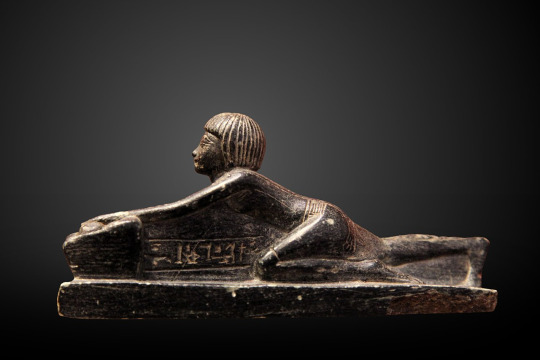
Or this one, depicting him as a mummy on a bier, a ba-bird on his chest:

There are also 7 vases with inscriptions bearing his name in the Louvre collection.
Somewhere after year 30 of Amenhotep's reign, however, Prince Thutmose died of unknown causes. This resulted in his younger brother Amenhotep IV (later known as Akhenaten, or Pharaoh Phucknugget), succeeding the throne after Amenhotep III’s death.
#I am physically incapable of mentioning akhenaten without calling him names#not sorry#egyptology#ancient egypt#crown prince thutmose#wow forget to finish a wholeass sentence why don't you sonja
59 notes
·
View notes
Text
Now that we're on this spree of heartwarming or -breaking ancient Egyptian stuff, do you guys want to see a few Egyptian dog names? The internet cast the Egyptians as cat people pur sang, but the fact that crown prince Thutmose named his cat is actually a rare thing. Cats were kept mostly as pest control and, despite occassionally being portrayed on stelae and reliefs, didn't often seem to be considered companian animals. But dogs? Dogs were, and they always had names.
bHkAi, “Gazelle”
AbAqr, “Hound” (Old Berber)
phts, “Black one”
tqrw, “Khenfet-kettle”
tknrw (?)
Hmw-m-mA, “The-tail-is-as-a-lion’s”
djw-nw, “The fifth”
n-mr.n=i, “I don’t like”
anx.w, “Living one”
TAw-n-anx-n-snbi, “Breath-of-life-for-Senebi”
mniw-pw, “He is a shepherd”
aia, “Woofer”
6K notes
·
View notes